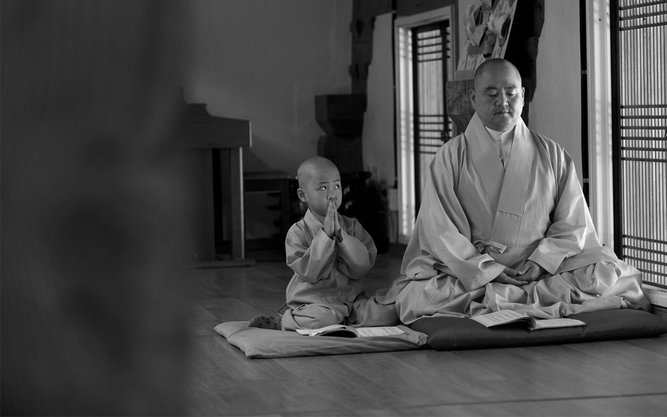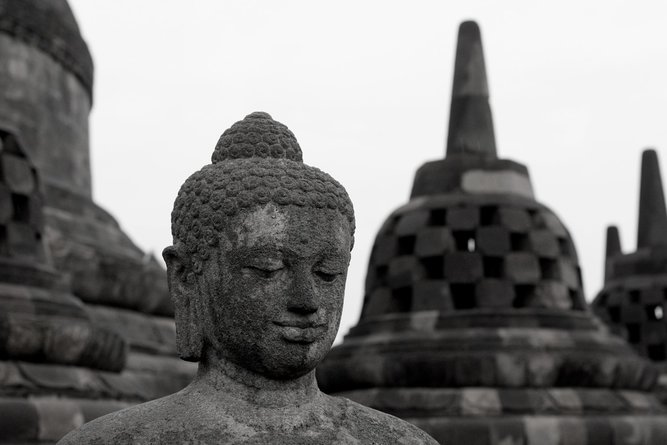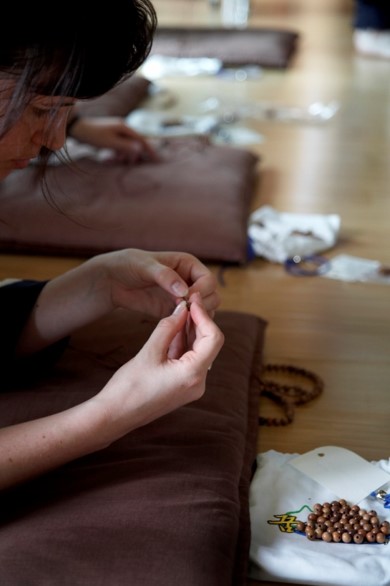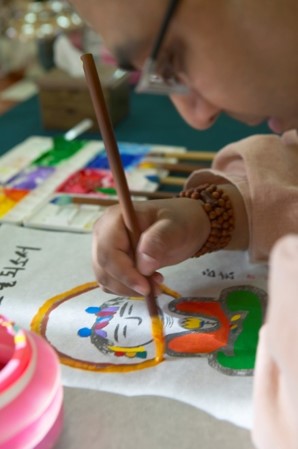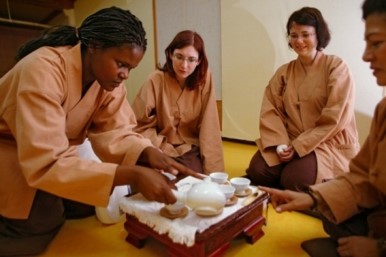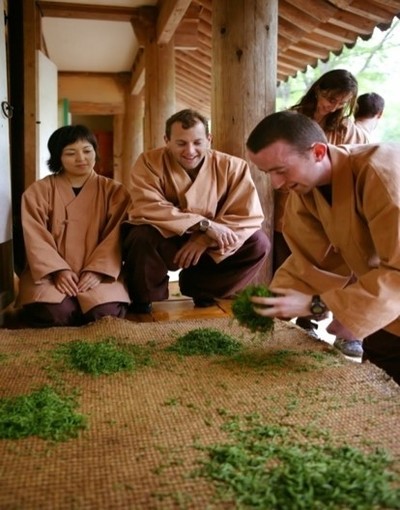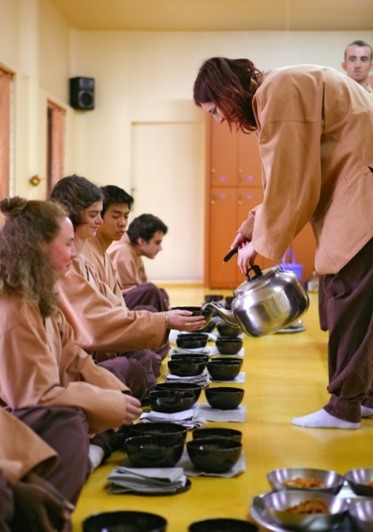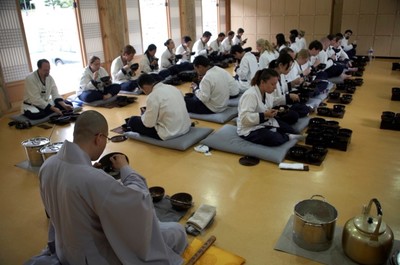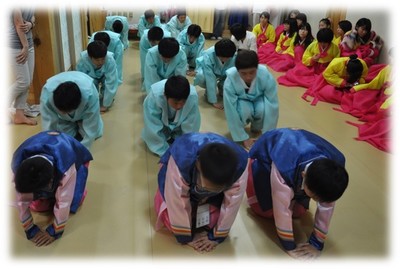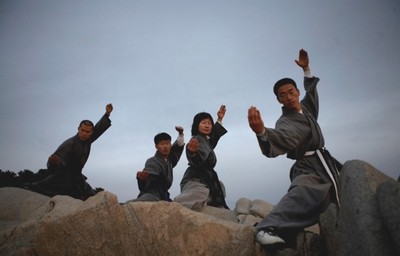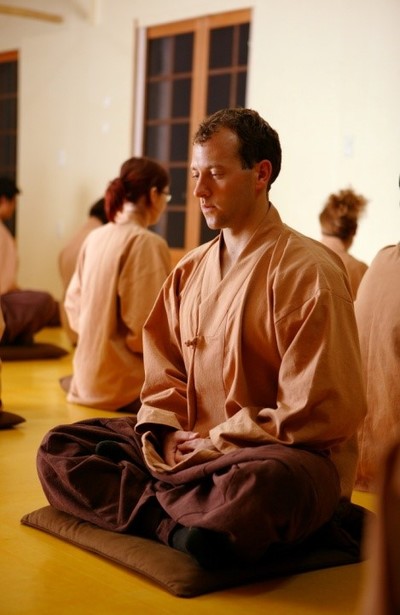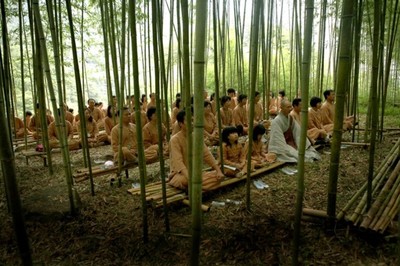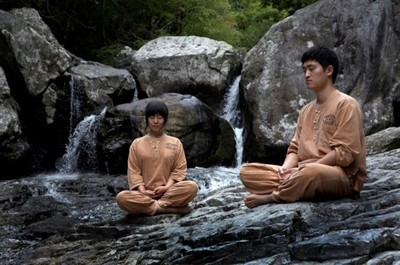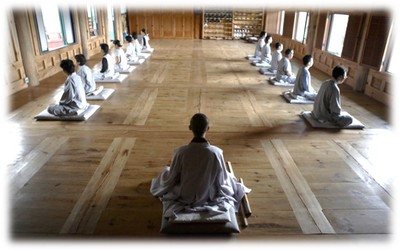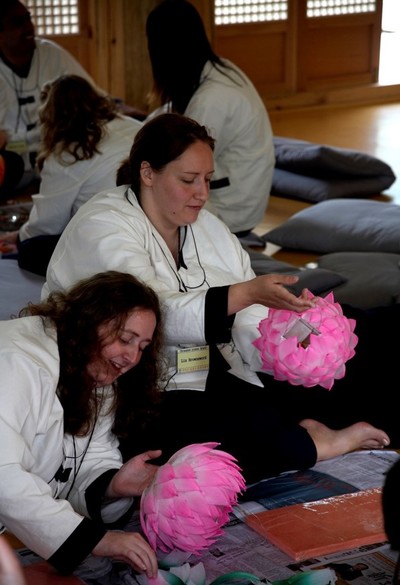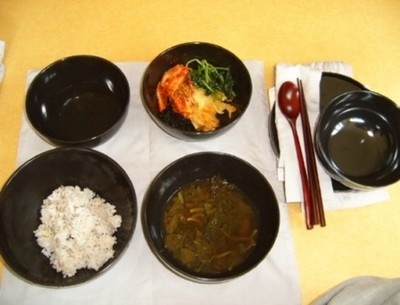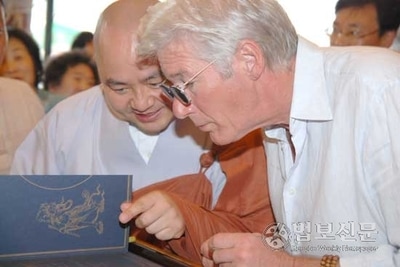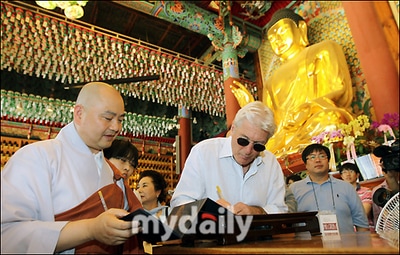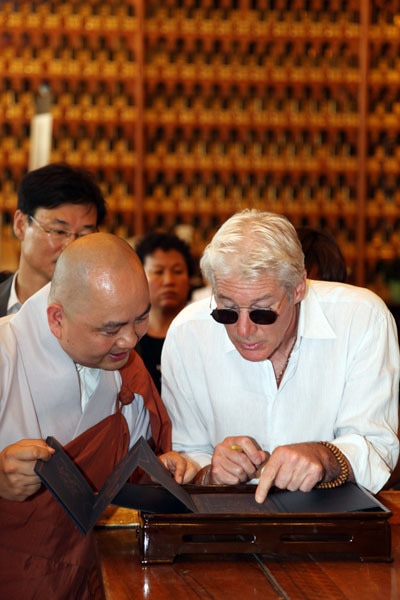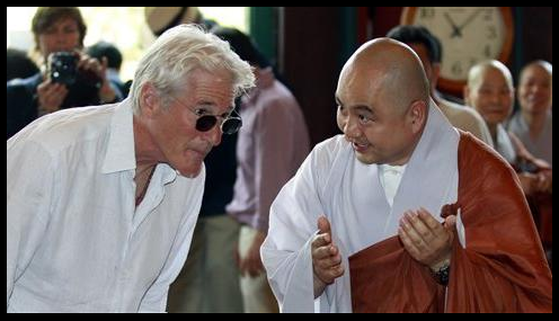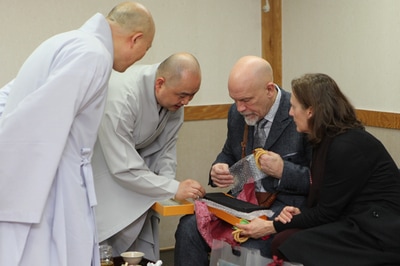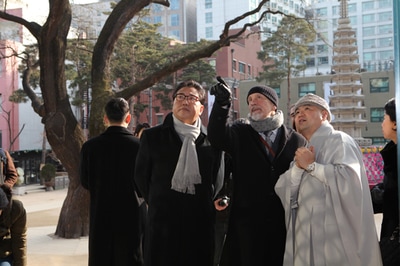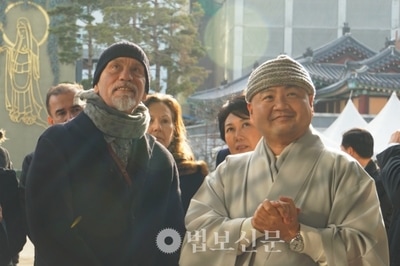Venerable Sungjin,
a monk from South Korea
I was a student activist in South Korea's turbulent new democracy. Running from police one day after a demonstration, I took refuge in a temple and began chatting to the Zen master there. The rest, as they say, is history: I am a monk in South Korea.
Emptying Your Mind
The first step of emptying your mind is to fill it with the right view.
The phase ‘emptying’ comes off as something as simple as pouring water out of a cup. But doing it with your mind, instead of plain water could make it the most difficult task in the world.
The expression has a specific visual, but the content itself is psychological, and that could render the actual practice very abstract. Also, we are very self-centered, only used to holding onto something we want or like, and not very familiar with letting things go. Consequently, there’s a tendency to perceive ‘emptying one’s mind’ as passive and trivial. One of the most popular sutras in Mahayana tradition is Diamond Sutra. It is a very important Sutra to understand and practice what Middle Path(Madhyamapratipad) is and Seon Buddhism. There is a phrase that goes as below:
“A disciple should give rise a mind which is no way dependent upon sights, sounds, smells, tastes, sensory sensations or any mental conception. A disciple should give rise to a mind which does not attach to anything.”
-Diamond Sutra: Chapter 10
This is the phrase that I place the most importance in the Sutra and also the part which lay people have the most difficulty understanding. In words, it sounds self-contradictory but simply put; it is as if you need to step and push upon the ground and jump off the earth surface to reach higher. More practical and fitting example would be similar to the story below.
In South Korea, the last year of high school preparing for college entrance is the most dreaded and feared period for both students and their families. There is even a famous saying that goes as ‘the last year of high school is when most people decide to take up a religion.’ To parents, there would be no phrase more confusing than ‘praying without any purpose or attachments.’
So I explain to them what it means to pray without attachments.
The phrase above means to be able to pray for the better future of their children without having ideas about which school is good and which is bad, or forcing their children to do better at exams because of the resources spent and such. Then I tell them to fill their heart instead of with the happiness, and I remind they of them that they only wished to live healthily and love each other when they gave births to their children. They love their children with no strings attached. By following this, the lay people can fill their mind with gratitude and love towards each other and let go of greed, anger, and ignorance, the three poisons the Buddha told us to get rid of.
It is similar to removing dirty water in a container by filling it up with clean water and therefore displacing it. This is precisely why people need to practice having the right view a lot more than trying to simply empty their thoughts. The Buddha has shown us the noble eightfold paths for us to remove attachments, and this is the clean water.
The noble eightfold paths(āryāṣṭāṅgamārga) are
1 Right view: our actions have consequences; Cause and Effect and Dependent Arising.
2 Right intention: Being resolved on renunciation, on freedom from ill-will, on harmlessness.
3 Right speech: Abstaining from lying, divisive speech, abusive speech and idle chatter.
4 Right action: Abstaining from killing, stealing, sexual misconduct.
5 Right livelihood: being noble without effluents and maintaining his life with right livelihood.
6 Right effort: Exerting his mind, and to prevent the arising of evil and unwholesome mental state that have not yet arisen.
7 Right mindfulness: Never be absent minded. Being conscious of what one is doing, having put aside worldly desire and sadness.
8 Right concentration(samadhi): Practicing four stages of mediation(dhyana) culminating into the unification of the mind.
The meaning of “Right” is to have thoughts based on the three marks of existence (tilakkhaṇa). Everything is subject to constant change and without a fixed true nature, and realizing reminding oneself with such view helps getting rid of the three poisons and ultimately leads to enlightenment. However, refusing to accept the idea and thinking otherwise would turn everything into causes of suffering.
If someone with status and power reminds himself of the fact that his power and status do not last forever and are not his actual characteristic, only dependent upon his current position, which has been ultimately given to him from the people. In actuality, he has emptied his mind of obsession about the status and power by the right view.
That is how filling oneself’s mind with the right view based on the three marks or existence removed the three poisons. Only after filling oneself with the right view, comes right action, and right action also leads to a peaceful mind. Then our purified mind becomes the source of unlimited compassion and brightens ourselves and the whole world.
So, I say that the first step of emptying one’s mind is to put an effort to first fill it with right view. In Mahayana tradition, every Buddhas and Bodhisattva have achieved enlightenment by cherishing a vow. We shall, too, cherish such vows with right view.
I’d like to introduce The great ten vows of the Tathagatas in Thousand Hands Sutra, another very popular sutra in Korea.
1. I vow to always stay from the three evil ways.
2. I vow to quickly cut off the three poisons of desire, anger, and ignorance.
3. I vow to always listen to Buddha, Dharma, and Sangha all alive.
4. I vow to diligently cultivate precepts, meditation ceaselessly, and wisdom all found.
5. I vow to ceaselessly learn Dharma
6. I vow never to abandon to attain the enlightened mind(Bodhicitta)
7. I vow to be reincarnated in the paradise of the blissful land of Amitabha Buddha in the West.
8. I vow to hurry and meet Amitabha Buddha in the paradise.
9. I vow to disseminate myself throughout the universe like particles.
10. I vow to bring all sentient beings to nirvana.
I have faith in that the world will become peaceful and blissful place if everyone fills their mind with the ten vows.
The phase ‘emptying’ comes off as something as simple as pouring water out of a cup. But doing it with your mind, instead of plain water could make it the most difficult task in the world.
The expression has a specific visual, but the content itself is psychological, and that could render the actual practice very abstract. Also, we are very self-centered, only used to holding onto something we want or like, and not very familiar with letting things go. Consequently, there’s a tendency to perceive ‘emptying one’s mind’ as passive and trivial. One of the most popular sutras in Mahayana tradition is Diamond Sutra. It is a very important Sutra to understand and practice what Middle Path(Madhyamapratipad) is and Seon Buddhism. There is a phrase that goes as below:
“A disciple should give rise a mind which is no way dependent upon sights, sounds, smells, tastes, sensory sensations or any mental conception. A disciple should give rise to a mind which does not attach to anything.”
-Diamond Sutra: Chapter 10
This is the phrase that I place the most importance in the Sutra and also the part which lay people have the most difficulty understanding. In words, it sounds self-contradictory but simply put; it is as if you need to step and push upon the ground and jump off the earth surface to reach higher. More practical and fitting example would be similar to the story below.
In South Korea, the last year of high school preparing for college entrance is the most dreaded and feared period for both students and their families. There is even a famous saying that goes as ‘the last year of high school is when most people decide to take up a religion.’ To parents, there would be no phrase more confusing than ‘praying without any purpose or attachments.’
So I explain to them what it means to pray without attachments.
The phrase above means to be able to pray for the better future of their children without having ideas about which school is good and which is bad, or forcing their children to do better at exams because of the resources spent and such. Then I tell them to fill their heart instead of with the happiness, and I remind they of them that they only wished to live healthily and love each other when they gave births to their children. They love their children with no strings attached. By following this, the lay people can fill their mind with gratitude and love towards each other and let go of greed, anger, and ignorance, the three poisons the Buddha told us to get rid of.
It is similar to removing dirty water in a container by filling it up with clean water and therefore displacing it. This is precisely why people need to practice having the right view a lot more than trying to simply empty their thoughts. The Buddha has shown us the noble eightfold paths for us to remove attachments, and this is the clean water.
The noble eightfold paths(āryāṣṭāṅgamārga) are
1 Right view: our actions have consequences; Cause and Effect and Dependent Arising.
2 Right intention: Being resolved on renunciation, on freedom from ill-will, on harmlessness.
3 Right speech: Abstaining from lying, divisive speech, abusive speech and idle chatter.
4 Right action: Abstaining from killing, stealing, sexual misconduct.
5 Right livelihood: being noble without effluents and maintaining his life with right livelihood.
6 Right effort: Exerting his mind, and to prevent the arising of evil and unwholesome mental state that have not yet arisen.
7 Right mindfulness: Never be absent minded. Being conscious of what one is doing, having put aside worldly desire and sadness.
8 Right concentration(samadhi): Practicing four stages of mediation(dhyana) culminating into the unification of the mind.
The meaning of “Right” is to have thoughts based on the three marks of existence (tilakkhaṇa). Everything is subject to constant change and without a fixed true nature, and realizing reminding oneself with such view helps getting rid of the three poisons and ultimately leads to enlightenment. However, refusing to accept the idea and thinking otherwise would turn everything into causes of suffering.
If someone with status and power reminds himself of the fact that his power and status do not last forever and are not his actual characteristic, only dependent upon his current position, which has been ultimately given to him from the people. In actuality, he has emptied his mind of obsession about the status and power by the right view.
That is how filling oneself’s mind with the right view based on the three marks or existence removed the three poisons. Only after filling oneself with the right view, comes right action, and right action also leads to a peaceful mind. Then our purified mind becomes the source of unlimited compassion and brightens ourselves and the whole world.
So, I say that the first step of emptying one’s mind is to put an effort to first fill it with right view. In Mahayana tradition, every Buddhas and Bodhisattva have achieved enlightenment by cherishing a vow. We shall, too, cherish such vows with right view.
I’d like to introduce The great ten vows of the Tathagatas in Thousand Hands Sutra, another very popular sutra in Korea.
1. I vow to always stay from the three evil ways.
2. I vow to quickly cut off the three poisons of desire, anger, and ignorance.
3. I vow to always listen to Buddha, Dharma, and Sangha all alive.
4. I vow to diligently cultivate precepts, meditation ceaselessly, and wisdom all found.
5. I vow to ceaselessly learn Dharma
6. I vow never to abandon to attain the enlightened mind(Bodhicitta)
7. I vow to be reincarnated in the paradise of the blissful land of Amitabha Buddha in the West.
8. I vow to hurry and meet Amitabha Buddha in the paradise.
9. I vow to disseminate myself throughout the universe like particles.
10. I vow to bring all sentient beings to nirvana.
I have faith in that the world will become peaceful and blissful place if everyone fills their mind with the ten vows.
Buddhism in Korea
Korea has more than 1700 years of buddhism.
Venerable Sungjin & Movie Stars
With Richard Gere
Richard Gere was visiting Jogyesa (Jogye Temple), a Buddhist temple in Seoul where he received gifts of prayer beads, ceremonial clothing and porcelain incense burners from Venerable Sungjin. Richard appreciates Korean Buddhism's traditions and wants them to stay strong.
